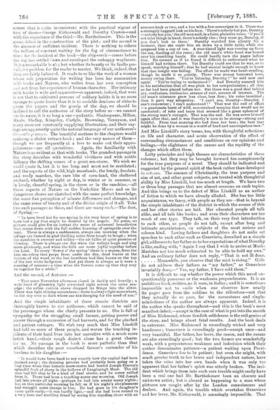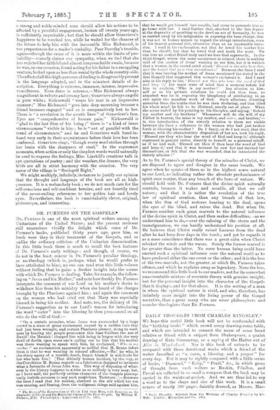And the second, of Autumn
That same November afternoon closed in darkly and heavily ; a wide band of gleaming light stretched right across the outer seaedge ; the sullen curtain above dropped its fringe into the silver. There was light shining somewhere—there is always light somewhere, be the day ever so dark where one sits drooping for the need of EMI." And the simple inhabitants of these remote districts are thoroughly known to our authoress, which cannot be said of
the personages whom she chiefly presents to us. She is full of sympathy for the struggling small farmer, getting poorer and poorer through a succession of bad harvests, and for the pinched and patient cottager. We wish very much that Miss Linskill had told us more of these people, and woven the touching incidents of their hard lives into her narrative with a much more lavish hand.—their rough dialect alone has a great charm for us. No passage in the book is more pathetic than that which describes the poor moorland farmer's surrender of his burdens to his daughter :—
" It would have been hard to say exactly how the capital bad been drained away ; the draining process had probably been going on s long time when that historic snow-storm had buried Joseph Craven's splendid flock of sheep in the hollows of Langbarugh Moor. The old man had felt that to be a kind of final stroke, and he never rallied from it. There had been a touching scene one morning. Old Joseph had lain awake all night—perhaps he had lain awake many nights ; but on this particular morning he felt as if his night's sleeplessness had wrought some change in him. He had gone to his daughter's room quite early,—it was hardly light,—and she bad been roused to a very keen and startling dread by seeing him standing-there with an account-book or two, and a box with a few sovereigns in it. There was a strangely haggard look on his face. There's nobody but you, Dorothy —nobody but you,' the old man said, in a faint, plaintive voice. 'If you'll not take things in hand, there's nobody else ; they must go, Dorothy, if you don't look to them.' Dorothy watched him silently for a moment, then she made him sit down by a little table, while she prepared him a cup of tea. A rose-tinted light was coming up from the sea, flooding all the room ; the old man's white head was bowed over his trembling hands. He could hardly turn the pages before him. He seemed as if he found it difficult to understand what be himself bad written there. Yet Dorothy could see that he was, so to speak, watching himself ; that he had mental insight enough to know that that insight was failing. The effort be made was heart-rending, though he made it so quietly. There was money borrowed here, money owing there. You're listening, Dorothy ?' he said now and again. You're trying to understand ? ' And Dorothy assured him to his satisfaction that all was plain to her comprehension ; all that so far had been placed before her. But there was a good deal behind yet, confusions, intricacies, arrears of rent, arrears of interest. The old man's utterance grew less clear, less firm ; his voice trembled ; then it gave way altogether. ` I can't see, Dorothy—Dorothy, I can't remember ; I can't understand ! ' That was the end of effort —a passionate burst of wild, unrestrained weeping that would not be comforted ; of sobs and tears that seemed like a great upheaval of the strong man's strength. That was the end. He was never himself again after that, and it was Dorothy's turn to be strong—strong and faithful. From that morning she had done her best; the best that might be done by a woman in a world of hard and unscrupulous men."
And Miss Linskill's story teems, too, with thoughtful reflections on life and character, and acute observation of the effect of surrounding circumstances and conditions on our opinions and feelings,—the slightness of the causes and the rapidity of the changes which affect them.
Lofty principles and high themes are characteristics of these volumes ; but they may be brought forward too conspicuously for the true purposes of a novel. They should be indicated and suggested by the general spirit of the book rather than developed
its exteneo. The essence of Christianity, the true purpose and aim of art, and other great subjects, are treated with thoughtful
ability by Miss Linskill, but too much at length. We have two or three long passages that are almost sermons on such topics. And this brings us to the defect of Miss Linskill as an author of fiction to which we have already alluded. She has too little acquaintance,"we fancy, with people as they are—that is, beyond the simple inhabitants of the district in which the scenes of this and her other stories are laid. Her educated people all talk alike, and all talk like books ; and even their characters are too much of one type. They talk, on their very first introduction to each other, as people do not talk, except after long and intimate acquaintance, on subjects of the moat serious and solemn kind. Loving fathers and daughters do not make set speeches to each other such as Genevieve, described as a simple girl, addresses to her father as to her expectations of what Dorothy is like, ending with, " Again I say that I wish to arrive at MurkMarishes not too much exhausted to be able to hold my own.."
And an ordinary father does not reply, " That is not ill done.
Meanwhile, you observe that the mist is rising." Girls do not address their fathers as "my father," as Genevieve invariably does,—" Yes, my father, I have sold them."
It is difficult to say whether the power which this novel un questionably possesses or the weakness preponderates. It is an ambitious book, written, as it were, in italics ; and it is sometimes impossible not to smile when one observes how nearly its pages pass from the sublime to the ridiculous—not that they actually do so pass, for the earnestness and single
mindedness of the author are always apparent. Indeed, it is the author who speaks throughout—and this is the book's most manifest defect,—except in the case of what is put into the mouth of Miss Richmond, whose fiendish selfishness is the evil genius of the story, and brings about fatal results. And the book deals in extremes. Miss Richmond is exceedingly wicked and very handsome ; Genevieve is exceedingly good—except once—and very beautiful. Her father, her lover, the canon, and the curate are also exceedingly good ; but the two former are wonderfully weak, with a preposterous weakness and indecision which their author denominates patience—a patient waiting upon Providence. Genevieve has to be patient; but even she might, with
much greater truth to her brave and independent nature, have taken the reins into her own hands when it was only too apparent that her father's spirit was utterly broken. The inci dent which brings them into such sore trouble might easily have been a real one had Mr. Bartholomew been an obscure and unknown artist; but is absurd as happening to a man whose pictures are sought after by the London connoisseurs and dealers. And again, the trouble which overtakes Genevieve and her lover, Mr. Kirkoswald, is amusingly impossible. That a strong and noble-minded man should allow his actions to be affected by a youthful engagement, broken off twenty years ago, is sufficiently improbable ; but that he should allow Genevieve's happiness to be wrecked too, while he waited for the chances of the future to help him with the inexorable Miss Richmond, is too preposterous for a reader's credulity. Poor Dorothy's trouble, again—though the cause of it is more within the limits of probability—scarcely claims our sympathy, when we find that she has rejected her faithful and almost irreproachable swain, because he was, on one occasion, found acting for his father in a smuggling venture, looked upon as less than venial by the whole country-side. The effect ofall this high-pressure of feeling is disagreeably present in the language adopted, and in the minutest details of description. Everything is extreme, immense, intense, impressive, tumultuous. Even dress is extreme,—Miss Richmond always magnificent in velvets and creamy lace ; Genevieve always angelic in pure white; Kirkoswald "wears his coat in an impressive manner ;" Miss Richmond " goes into deep mourning because a friend becomes engaged " and so is comparatively lost to her. There is " a revelation in the ascetic lines " of Genevieve's face. Eyes are " comprehensive of human pain." Kirkoswald is "glad to the last fibre of his being ;" there is " a kind of inner strenuousness" visible in him ; he is " out of parallel with the trend of circumstance," and he and Genevieve walk hand-inhand very early in their acquaintance before their love has been confessed. Genevieve sings, " though every word strikes through her brain with the sharpness of steel." In the supremest moments, when action or only the simplest words would naturally be used to express the feelings, Miss Linskill's creations talk in apt quotations of poetry ; and the weather, the dreams, the very birds are all in strict harmony with the occasion. The very name of the village is " Soulsgrif Bight."
We might multiply, infinitely, instances to justify our opinion that the thought and language of the book are all at highpressure. It is a melancholy book ; we do not much care for the self-conscious and self-confident heroine, and are heartily tired of the never-ending references to her golden hair and lovely eyes. Nevertheless, the book is unmistakably clever, original, picturesque, and interesting.



































 Previous page
Previous page